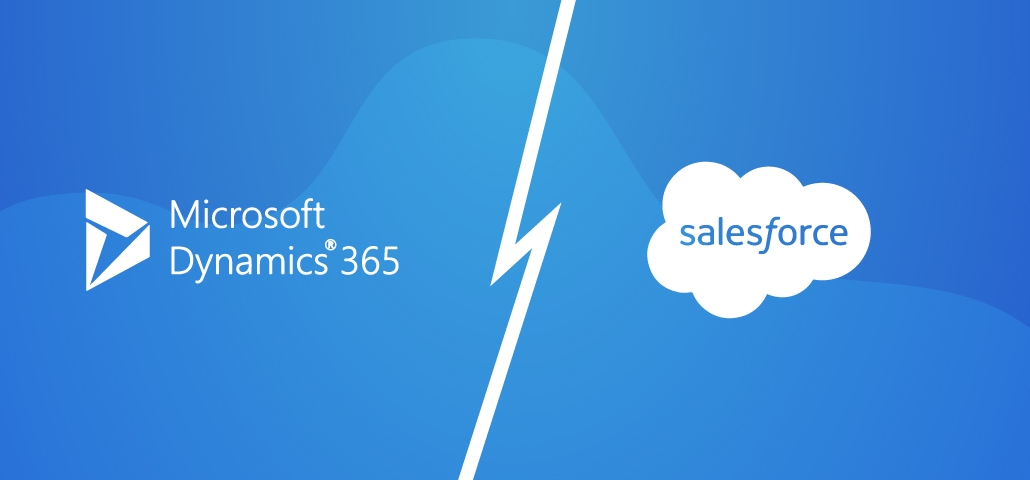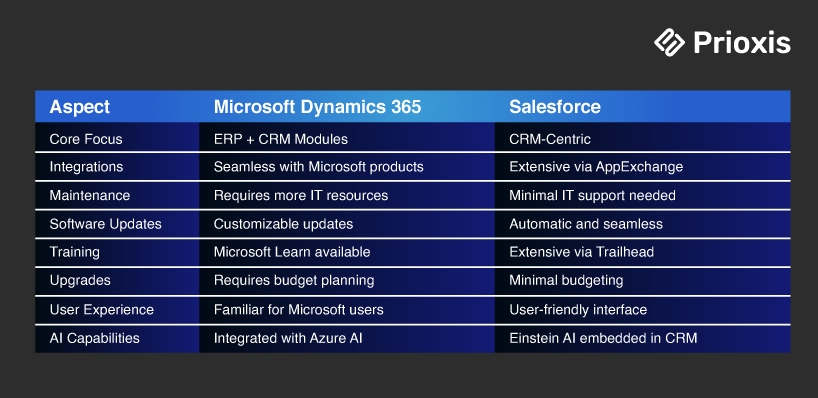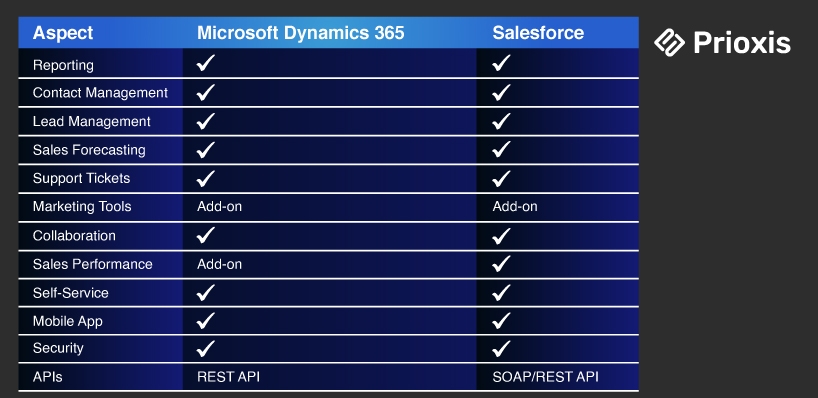
Table of Content
Around 65% of businesses choose to implement a CRM solutions within their first five years, highlighting the importance of selecting the right platform. The choice of CRM can make a significant difference in optimizing your operations, improving customer interactions, and driving business growth. With numerous CRM options available, Microsoft Dynamics 365 and Salesforce are often the top contenders. Understanding the unique advantages and potential drawbacks of each is essential for making an informed decision that best suits your business needs.
In this blog, we’ll compare Microsoft Dynamics 365 and Salesforce, focusing on their strengths and differences, especially how they incorporate AI. By the end, you’ll have a clearer sense of which CRM might best suit your enterprise's goals.
Customer Relationship Management (CRM) platforms are essential tools for managing and improving a company’s relationships with its customers. These platforms centralize customer data, streamline workflows, automate marketing efforts, and enhance sales and service processes. For enterprises, a robust CRM system is crucial for managing complex customer interactions and ensuring a seamless customer experience across all touchpoints.
Microsoft Dynamics 365 is a powerful suite of business applications that unify CRM and Enterprise Resource Planning (ERP) capabilities. This platform is designed to connect all aspects of your business, from sales and marketing to finance and operations, under one integrated system. For enterprises already using Microsoft products like Office 365, Azure, and Power BI, Dynamics 365 offers a seamless experience with deep integration across the Microsoft ecosystem.
Microsoft Dynamics 365 incorporates AI-driven tools through its Microsoft AI and Azure AI capabilities. These tools empower businesses to predict customer behavior, identify sales opportunities, and personalize marketing strategies. AI-powered features like chatbots and customer insights allow businesses to automate customer interactions, reduce response times, and improve service delivery. Predictive analytics and real-time recommendations further enhance decision-making, optimizing both sales and service processes.
Salesforce is a leading cloud-based CRM platform known for its flexibility and continuous innovation. It provides a comprehensive set of tools for managing customer relationships, including solutions for sales, marketing, and customer service. Salesforce’s AppExchange marketplace further extends its capabilities, allowing businesses to customize and expand their CRM with thousands of third-party applications.
Salesforce integrates AI through its Einstein AI suite, which helps businesses with automated data insights and predictions. Einstein AI offers capabilities such as predictive lead scoring, automated email marketing, and AI-powered customer service tools like chatbots and self-service portals. These AI features enable businesses to automate routine tasks, focus on high-value activities, and enhance customer experiences with personalized interactions.


A large financial institution integrated Microsoft Dynamics 365 with its existing Microsoft Azure and Office 365 platforms to automate customer service operations. By leveraging AI-driven insights, the institution was able to predict client needs more accurately, leading to faster customer resolutions and a 25% improvement in service efficiency.
An e-commerce giant adopted Salesforce to centralize customer data and automate marketing efforts. With the help of Salesforce Einstein AI, the company used predictive lead scoring to focus on high-potential leads, resulting in a 30% increase in conversions. Salesforce’s automation tools also enabled more personalized marketing campaigns, significantly boosting customer engagement.
Microsoft Dynamics 365 Solutions are particularly strong in industries such as manufacturing, retail, and finance, where their integration with other Microsoft products is highly valued. The platform is often chosen by large enterprises looking for a unified CRM and ERP solution.
Salesforce holds a significant share of the global CRM market and is popular across various industries, including technology, healthcare, and financial services. Its reputation for innovation and extensive third-party integrations makes it a preferred choice for companies prioritizing customer engagement.
While Microsoft Dynamics 365 offers extensive features and customization options, its implementation can be complex. Enterprises may need to partner with experienced implementation specialists, like Prioxis, to ensure a smooth and optimized deployment.
Salesforce’s cloud-based architecture makes it easier to deploy, but the wide range of customization options can still be daunting. Partnering with certified Salesforce consultants can help businesses navigate the implementation process effectively.
Microsoft Dynamics 365 users benefit from a growing community, extensive documentation, and strong support services from Microsoft. The platform also offers a network of certified partners to assist with implementation and ongoing support.
Salesforce has one of the largest user communities in the CRM space. The Salesforce Trailblazer Community, along with resources like AppExchange and Trailhead, provides ample support for users, making it easier to find solutions and stay updated on best practices.
Microsoft Dynamics 365 offers a modular pricing model, which allows businesses to pay only for the applications they need. However, costs can increase with extensive customizations or additional integrations.
Salesforce’s subscription-based pricing model provides flexibility but can become expensive as advanced features and third-party apps are added. Despite this, the platform’s scalability and robust support can offer a high return on investment for businesses that fully utilize its capabilities.
The choice between Microsoft Dynamics 365 and Salesforce ultimately depends on your business’s specific requirements, existing infrastructure, and future goals. Dynamics 365 may be the better choice for companies deeply invested in the Microsoft ecosystem, while Salesforce is ideal for businesses seeking flexibility and extensive third-party integrations.
At Prioxis, we understand the challenges that come with choosing and implementing a CRM platform, especially one with advanced AI capabilities. Whether you’re leaning towards Microsoft Dynamics 365 or Salesforce, our team of CRM experts can guide you through the process. From initial consultation to full implementation and beyond, we ensure that your CRM system is tailored to your business needs and drives the results you’re aiming for.
If you’re still unsure which CRM is right for your enterprise, Prioxis can help. Contact us today for a consultation and let us guide you toward the best CRM solution to support your business growth and customer management strategies.
Get in touch